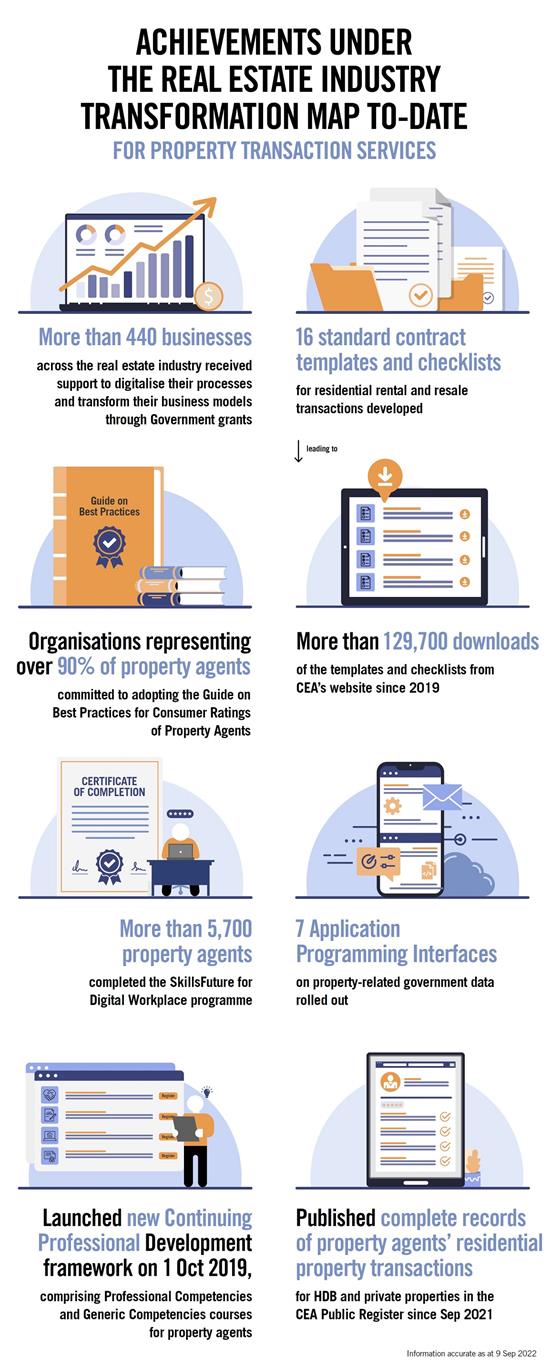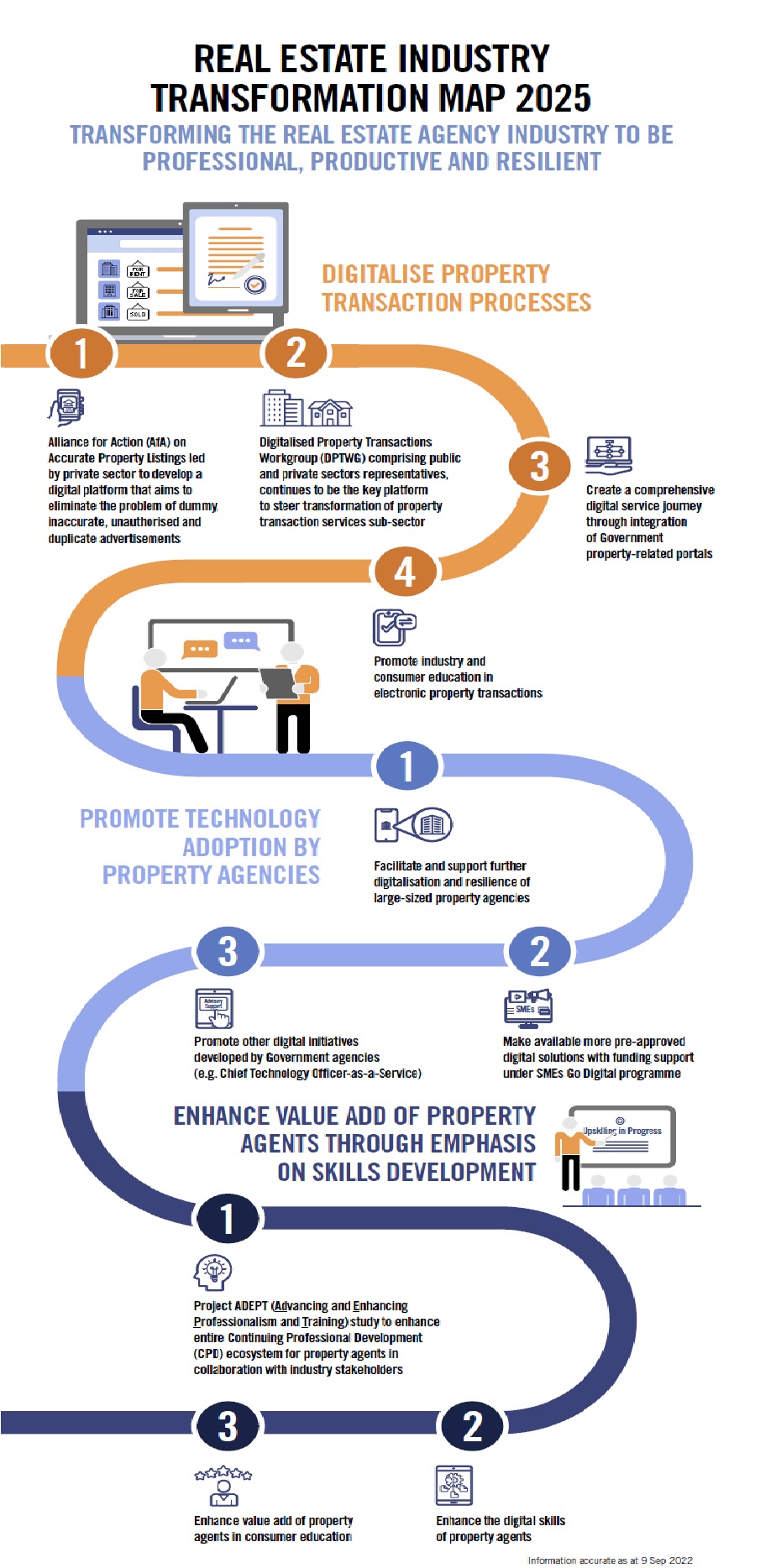The Real Estate Industry Transformation Map (ITM) (PDF,1760KB) provides a roadmap for the transformation of the real estate industry to be future-ready. It is one of the 23 roadmaps developed under the Industry Transformation Programme (ITM).
Real Estate Industry Transformation Map (ITM) Version 1.0
Launched on 8 February 2018, the Real Estate ITM (version 1.0) was developed to transform the real estate industry so that it can continue to grow and provide good jobs for Singaporeans.
The government, together with stakeholders from across the entire real estate value chain, collectively developed the Real Estate ITM. More than 50 engagement sessions with stakeholders, including property agencies, conveyancing lawyers, valuation firms, facility managers, property developers, and property technology firms, were conducted over a year since the start of 2017.
The Real Estate ITM focuses on the areas of property transaction services and facilities management*. Both areas have been identified as having immense potential for transformation.
The Real Estate ITM (version 1.0) has achieved the following:

Find out more about the initiatives under Real Estate ITM (version 1.0) by clicking the links below.
Real Estate ITM 2025
Since the launch of the Real Estate ITM (version 1.0), the operating environment of the real estate agency industry has evolved, and the industry now faces new challenges brought about by the COVID-19 pandemic. On 9 September 2022, CEA launched the Real Estate ITM 2025 under ongoing ITM 2025 efforts led by the Future Economy Council (FEC).
The vision of the refreshed Real Estate ITM 2025 is a real estate agency industry that is professional, productive and resilient.
The Real Estate ITM 2025 will focus on the following three strategies:
- Digitalise property transaction processes.
- Promote technology adoption by property agencies.
- Enhance value add of property agents through emphasis on skills development.

Digitalise Property Transaction Processes
The Alliance for Action (AfA) on Accurate Property Listings
The AfA on Accurate Property Listings, supported by CEA, was set up in November 2021 to develop a prototype digital platform to tackle the longstanding problem of dummy, unauthorised, inaccurate and duplicate property listings.
The AfA is co-led by the Singapore Estate Agents Association (SEAA), PropertyGuru and 99.co, with the five largest property agencies (PropNex, ERA, Huttons, OrangeTee & Tie and SRI) and online property listing and news portal EdgeProp as members. For more details, please refer to our Media Factsheet (PDF,684KB).
Digitalised Property Transactions Workgroup (DPTWG)
Through the Real Estate ITM version 1.0 launched in 2018, CEA has been chairing the DPTWG to implement initiatives to enable the entire real estate sector to move towards offering seamless, efficient, and secure property transactions from end-to-end. The workgroup comprises representatives from key government agencies and relevant industry associations that are involved in or support property transactions.
Find out more about these initiatives and the composition of the DPTWG (PDF,88.4KB).
Promote Technology Adoption by Property Agencies
CEA has partnered the Infocomm Media Development Authority (IMDA) and Enterprise Singapore (ESG) to introduce pre-approved digital solutions for the real estate agency industry under the SMEs Go Digital programme. The solutions help property agencies, especially small and medium-sized agencies, to increase productivity through digital automation, and cover areas such as document management and transaction records submission. For more details, please click here.
The Chief Technology Officer-as-a-Service (CTO-as-a-Service) initiative by IMDA also helps small and medium-sized property agencies to self-assess their digital readiness, access market-proven and cost-effective digital solutions, and get complimentary in-depth digital advisory and project management services from qualified consultants. For more details, please click here.
Enhance Value Add of Property Agents through Emphasis on Skills Development
CEA is working with the industry to strengthen professionalism and enhance the competencies of industry practitioners to remain competitive and relevant in the changing environment.
To achieve this, CEA implemented the current Continuing Professional Development (CPD) framework for property agents on 1 October 2019. The current CPD framework aims to facilitate agents to keep abreast of the latest changes in policies and procedures relating to property transactions, and to be equipped with the necessary knowledge and skillsets to thrive in digital environments.
Under Real Estate ITM 1.0, CEA partnered NTUC LearningHub to introduce the SkillsFuture for Digital Workplace programme contextualised for the real estate industry workforce, to help them remain competitive and relevant in the digital environment. CEA will continue to work with the real estate agency industry under Real Estate ITM 2025 to identify and curate relevant digital skills to improve the digital literacy and competency of property agents.
Find out more about these initiatives.
As part of CEA’s continuing commitment to develop the skills and competency of the industry under the Real Estate ITM 2025, CEA embarked on a study codenamed Project ADEPT (Advancing and Enhancing Professionalism and Training) with industry and academic stakeholders in August 2021 to review and enhance the entire CPD ecosystem. The aim is to have a CPD ecosystem to support and equip property agents with the relevant knowledge and capabilities to provide quality service and serve their clients competently, and be future-ready.
Based on the recommendations from Project ADEPT and feedback from the industry, CEA will be implementing eight measures to the CPD ecosystem progressively by 2025. Once implemented, the measures will further support the Real Estate ITM 2025 to build a real estate agency industry that is professional, productive and resilient. Find out more about the eight new enhancement measures here.
Additional Resources
* Note: Please contact the Building and Construction Authority for information about the Real Estate ITM initiatives for facilities management.